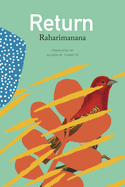
Author Raharimanana is an iconic figure in the Francophone literary world and within his native Madagascar. In the semi-autobiographical Return, protagonist Hira is an author who begins his story with a near drowning, which throws him immediately into tension with elemental forces that are both threatening and necessary for his survival.
The novel follows Hira on a book tour throughout Madagascar and his concurrent grappling with his memories, his sense of identity, and various losses accumulated over his and his family's lifetimes. Hira has repressed the violence enacted upon his family and his country and finds it erupting through his subconscious in his dreams. Through a series of non-linear recollections, writing, and reflections, he embarks on a quest to free himself from generational pain and embrace the promise of return to love and life.
Translator Allison M. Charette adroitly hits every note of the elliptical, lyrical prose. The writing style is fragmented and introspective, blending poetic imagery with stream-of-consciousness text and creating a dreamlike atmosphere. The language is evocative, highly poetic with intense imagery, often contrasting sensual images with those of brutal violence. Recurring metaphors and symbols explore themes of identity, trauma, and enduring love, as when the author writes, "Love is a nomad's land where looking grows the roots."
For Hira, writing serves as a refuge and a tool for processing personal and generational trauma, preserving his memories, and reclaiming his identity. Writing also helps him confront his family's history, bridge the gap between the past and present, and recover the wonder and innocence of childhood amid violence and loss. --Elizabeth DeNoma, executive editor, DeNoma Literary Services, Seattle, Wash.

